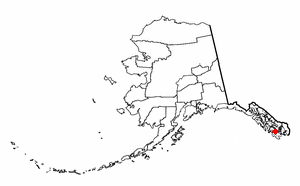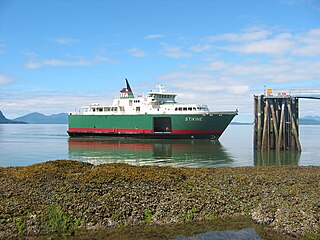
Southeast Alaska, often abbreviated to southeast or southeastern, and sometimes called the Alaska(n) panhandle, is the southeastern portion of the U.S. state of Alaska, bordered to the east and north by the northern half of the Canadian province of British Columbia. The majority of southeast Alaska is situated in Tlingit Aaní, much of which is part of the Tongass National Forest, the United States' largest national forest. In many places, the international border runs along the crest of the Boundary Ranges of the Coast Mountains. The region is noted for its scenery and mild, rainy climate.

Prince of Wales–Hyder Census Area is a census area located in the U.S. state of Alaska. As of the 2020 census, the population was 5,753, up from 5,559 in 2010. It is part of the unorganized borough and therefore has no borough seat. Its largest communities are Metlakatla and Craig. It was formerly part of the Census Bureau's Prince of Wales–Outer Ketchikan Census Area, but the name was changed in 2008 after most of the Outer Ketchikan was lost to annexation by the Ketchikan Gateway Borough.

Ketchikan is a city in and the borough seat of the Ketchikan Gateway Borough on Revillagigedo Island of Alaska. It is the state's southeasternmost major settlement. Downtown Ketchikan is a National Historic Landmark District.

Hollis is a census-designated place (CDP) on Prince of Wales Island in Prince of Wales-Hyder Census Area, Alaska, United States. At the 2020 census the population was 65, down from 139 in 2000.

Klawock is a city in Prince of Wales–Hyder Census Area, in the U.S. state of Alaska, on the west coast of Prince of Wales Island, on Klawock Inlet, across from Klawock Island. The population was 755 at the 2010 census, down from 854 in 2000. It is located 90 kilometres (56 mi) from Ketchikan, 11 kilometres (6.8 mi) from Craig, and 39 kilometres (24 mi) from Hollis.

Wrangell is a borough in Alaska, United States. As of the 2020 census the population was 2,127, down from 2,369 in 2010.

Prince of Wales Island is one of the islands of the Alexander Archipelago in the Alaska Panhandle. It is the fourth-largest island in the United States and the 97th-largest island in the world.

The Alaska Marine Highway (AMH) or the Alaska Marine Highway System (AMHS) is a ferry service operated by the U.S. state of Alaska. It has its headquarters in Ketchikan, Alaska.

M/V Taku is a Malaspina-class mainline vessel built for the Alaska Marine Highway System. The ship has been retired and was sold to a Dubai-based company for $171,000. The owner sought to sell the ferry internationally, and was unsuccessful, and it was last seen beached in Alang, India, to be scrapped.

MV Fairweather is a catamaran ferry built by Derecktor Shipyards in Bridgeport, Connecticut for the Alaska Marine Highway System entering service 2004. After being laid up since 2019, in March 2021 it was sold to Servicios y Concesiones Maritimas Ibicencas for service between Mallorca and Menorca.

MV Matanuska, colloquially known as the Mat, is a mainline Malaspina-class ferry vessel operated by the Alaska Marine Highway System.

The M/V Columbia is a mainline ferry vessel for the Alaska Marine Highway System.

MV Lituya is a shuttle ferry operated by the Alaska Marine Highway System. Her route connects Metlakatla on Annette Island to Ketchikan.

USCGC Maple (WLB-207) is a Juniper-class seagoing buoy tender operated by the United States Coast Guard. She was based at Sitka, Alaska for 16 years and is currently homeported at Atlantic Beach, North Carolina. Her primary mission is maintaining aids to navigation, but she also supports search and rescue, law enforcement, oil spill response, and other Coast Guard missions.
The Inter-Island Ferry Authority (IFA) is a ferry service in the U.S. state of Alaska with its headquarters in Hollis, Alaska on Prince of Wales Island.

M/V Stikine is a ferry operated by the Inter-Island Ferry Authority. Her regular route is between Ketchikan and Hollis, in Southeast Alaska.

The MV Wickersham was a mainline ferry vessel for the Alaska Marine Highway. Wickersham was the second vessel, after the MV Chilkat, in the Alaska Marine Highway fleet to not have been constructed specifically for AMHS, but was rather acquired for from the Stena Line, where it was known as the Stena Britannica and served the Kiel, Germany–Gothenburg, Sweden route. Constructed just one year prior to its purchase by AMHS in April 1968, her arrival and status as an "oceangoing" vessel allowed AMHS to expand the southern terminus of its route system south to Washington and the Port of Seattle.

USCGC Liberty (WPB-1334) is an Island-class cutter of the United States Coast Guard. She spent her first 33 years of service homeported in Juneau, Alaska where she patrolled territorial waters, including the Inside Passage. In 2016 she won the Hopley Yeaton Cutter Excellence Award for outstanding operational and humanitarian achievements. In 2022 she was reassigned to Valdez, Alaska.

MV Tazlina is a ferry operated by the Alaska Marine Highway System. It began serving Southeast Alaska Communities in 2019.

The USCGC Sweetbrier (WAGL-405/WLB-405) was an Iris-class 180-foot seagoing buoy tender operated by the United States Coast Guard. She served in the Pacific during World War II. Her entire post-war career with the Coast Guard was spent in Alaska. After she was decommissioned in 2001, she was transferred to the Ghana Navy and renamed Bonsu. She is still active.


















